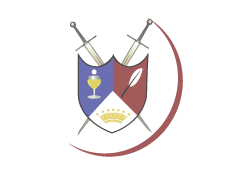You are here
 April 28 2004
Nicea and the "Invasion" of Bishops in Other Dioceses - by Dr. Robert J. Sanders
April 28 2004
Nicea and the "Invasion" of Bishops in Other Dioceses - by Dr. Robert J. Sanders
When one reads the acts of the Council of Nicea, several facts become readily apparent. First, it was understood that bishops belonged to the order of the Church. That is to say, all Christians were to be under the oversight of a bishop. Further, there was to be only one bishop in each diocese, or only one ruling bishop. Third, bishops were not to officiate in dioceses other than their own, except perhaps, by invitation.
Read more April 23 2004
The Death of Death in the Death of Christ - by Terence Kelshaw
April 23 2004
The Death of Death in the Death of Christ - by Terence Kelshaw
The commentator had high praise for what is sometimes called the thinking man's church, the Episcopalians, because apparently we do not take the gospel story literally but rather as a set of spiritual insights to help us toward our becoming Christ.
Read more April 18 2004
CANTERBURY CATHEDRAL: Archbishop of Canterbury's Easter Sermon
April 18 2004
CANTERBURY CATHEDRAL: Archbishop of Canterbury's Easter Sermon
The point was that most of those who first heard the Easter gospel would have found it grotesque or even frightening. Resurrection was not a joyful sign of hope but an alarming oddity, something potentially very dangerous. The dead, if they survived at all, lived in their own world - a shadowy place, where they were condemned to a sort of half-life of yearning and sadness.
Read more April 12 2004
Some of My Best Friends are Gay: A Guide to Same-Sex Marriage- by Samuel Silver
April 12 2004
Some of My Best Friends are Gay: A Guide to Same-Sex Marriage- by Samuel Silver
This critical debate is not truly between homosexuals and heterosexuals;
it is between two opposing worldviews, one secular and the other
religious. [2] Approximately 80% of Americans hold a religious
worldview, [3] but the secular left has done an excellent, yet
nefarious, job of dividing those with a religious worldview through
false stereotyping. Their manipulative divide & conquer strategy has led
 March 30 2004
"Christianity and Islam", Collision or Convergence - by George Carey
March 30 2004
"Christianity and Islam", Collision or Convergence - by George Carey
The theme of my course at the Gregorian has been ‘Unity and Mission’. My desire to offer a lecture on Christian-Muslim relations tonight has not only been fired by the course I have given, but also because for the last ten years or so it has been an important strand in my ministry as a Christian leader.
Read more March 30 2004
AMiA: Report Released on Women's Ordination
March 30 2004
AMiA: Report Released on Women's Ordination
This ministry of "the priesthood of all believers" or of "the whole people of God," involves us all. Men and women are both gifted by God. They bring complementary sensibilities to ministry, and both need to be properly equipped, openly commissioned and fully recognized in the ministry of the Gospel. Given the tremendous scope of the mission that lies before us in a fallen world and in a secular society, we all need to be fully involved in ministry.
Read more March 20 2004
ORTHODOXY: The Real Watershed - by Peter C. Moore
March 20 2004
ORTHODOXY: The Real Watershed - by Peter C. Moore
One of Brown’s astonishing claims (presented as fast-paced truth) is that Jesus was never considered divine until, at the Emperor Constantine’s insistence, the Council of Nicea voted him so in 325 A.D. Brown doesn’t explain why Christians of that day never noticed this sudden change in their doctrine of Christ.
Read more March 18 2004
OHIO: Canon Theologian Responds to Ohio's Actions
March 18 2004
OHIO: Canon Theologian Responds to Ohio's Actions
These and other similar steps are part of a larger picture of an
Episcopal community in crisis whose primary overseers remain sadly in
denial.
 March 13 2004
Thoughts for a congregation divided as it faces the homosexuality issue
March 13 2004
Thoughts for a congregation divided as it faces the homosexuality issue
Note to the reader: the strong majority in this particular congregation favored the traditional position. There was a much smaller group favoring greater openness to rethinking the issue. Some of these had already left; others were wondering if there could be a place for them. The emphases in this address are therefore somewhat different from those that might be made in a parish where the dividing line fell the other way.
Read more March 13 2004
"The Gathering Storm" By Robin Guinness
March 13 2004
"The Gathering Storm" By Robin Guinness
At heart the same sex blessing controversy is a theological issue,
not an issue of life-style. It is an issue of belief before it is an
issue of behaviour.



